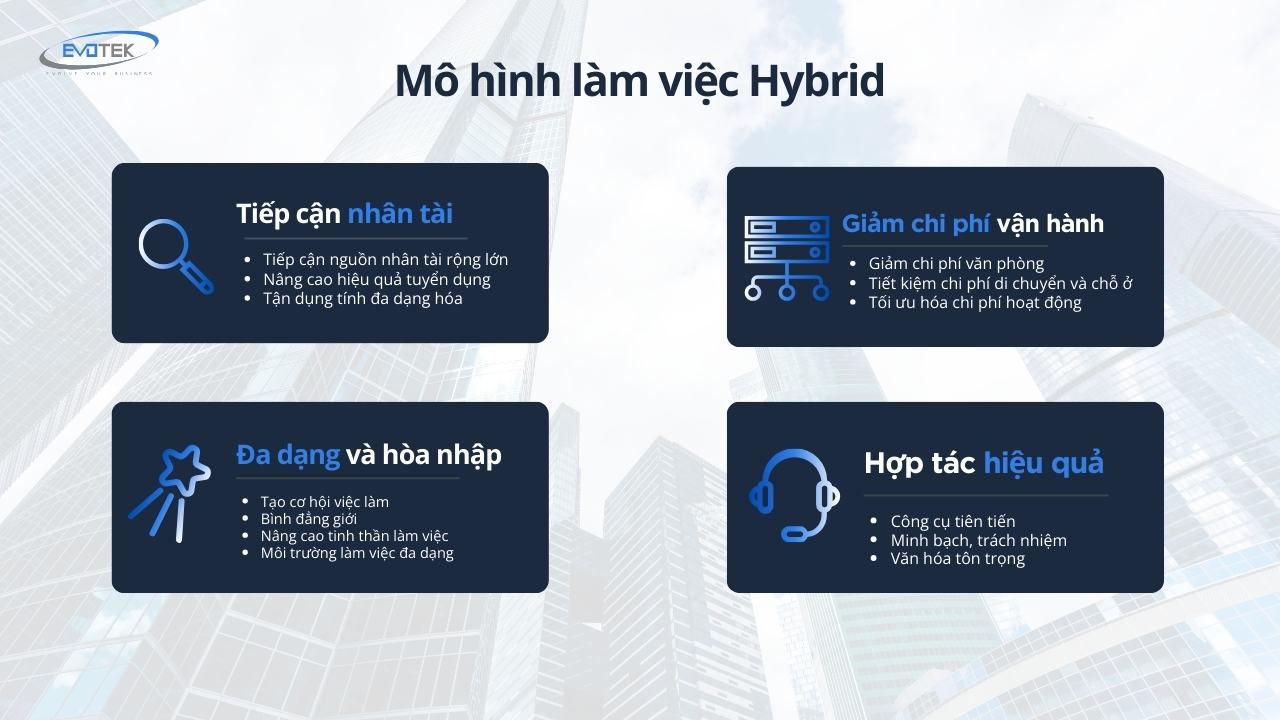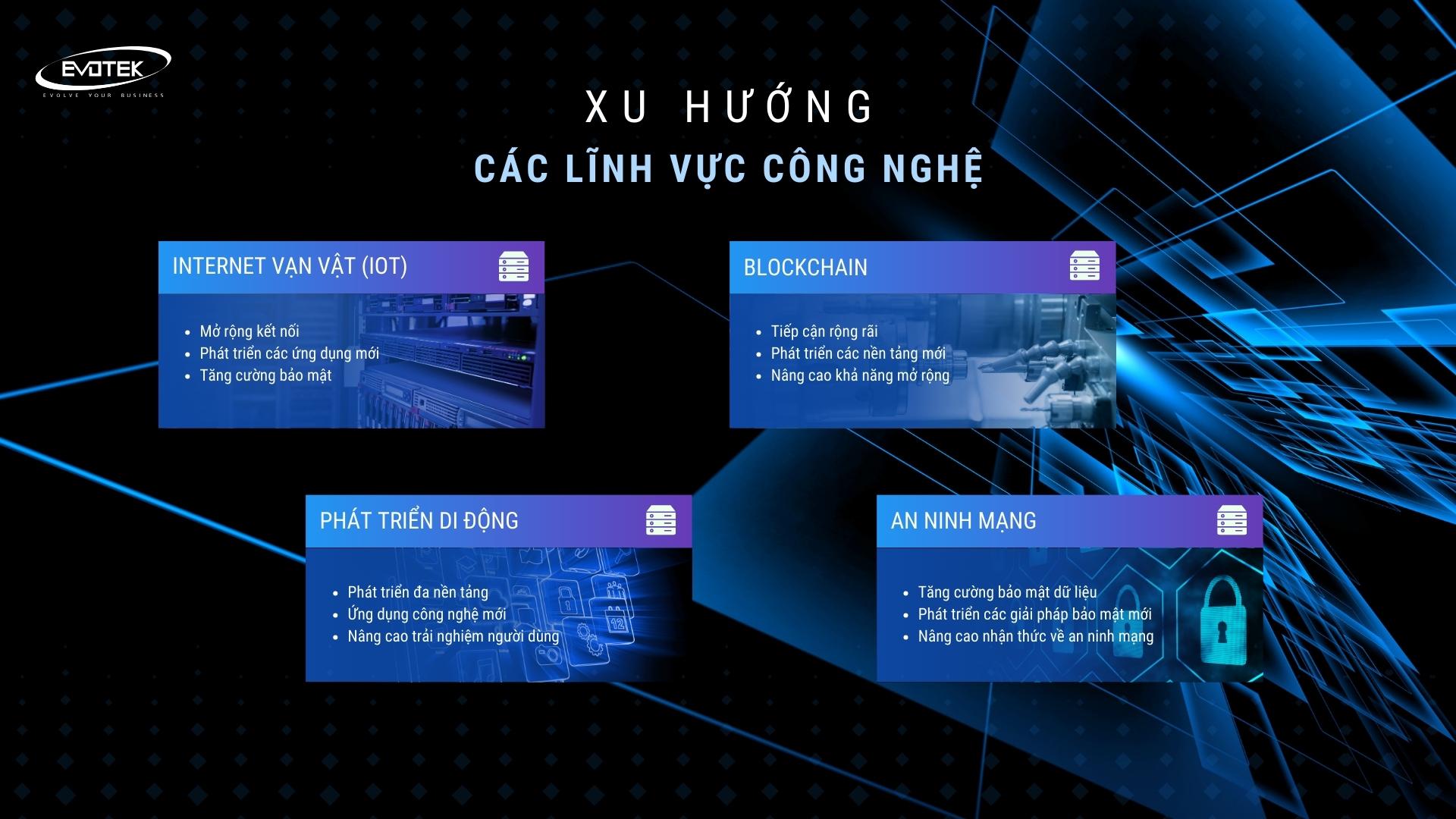In the contemporary business landscape, outsourcing software development has become integral to the operations of digital businesses. However, the challenge lies in establishing an internal team capable of meeting the evolving demands of the industry.
The emergence of software development outsourcing services (Outsourcing) is a direct response to technological advancements, evolving business requirements, and the phenomenon of globalization.
Understanding and adapting to these emerging trends is paramount for businesses aiming to harness the full potential of outsourcing, thereby gaining a competitive edge. Evotek remains abreast of the latest trends in the industry and is committed to sharing its expertise to support businesses on their digital transformation journey
1. The Rise of the Hybrid Work Model

The COVID-19 pandemic has precipitated a swift transformation in remote work practices, reshaping the landscape of software development outsourcing. A significant shift towards hybrid work models has emerged, wherein development teams operate across geographically dispersed locations while maintaining effective collaboration. This evolution affords companies several advantages
Access to a Diverse Talent Pool
- Geographical barriers are eradicated, granting businesses access to a vast global talent pool.
- The ability to recruit developers precisely tailored to specific project requirements is significantly augmented.
- Diversity in skills, experiences, and cultural backgrounds enriches project teams, fostering innovation and problem-solving.
Cost Reduction
- Elimination of office space requirements and associated overhead expenses like utilities and supplies.
- Reduction in travel and accommodation costs for employees
- translates to operational savings and increased profitability.
Promotion of Diversity and Inclusion
- Facilitation of opportunities for remote individuals and individuals with disabilities to actively participate in the workforce fosters a diverse and inclusive work environment.
- Improved gender balance in the software technology industry attracts more women to engage in the workforce, enhancing overall diversity and inclusion efforts.
- Elevated employee morale and engagement contribute to a culture of creativity and innovation.
Enhanced Collaboration and Communication Efficiency
- Advanced technological tools such as video calls, chat platforms, and project management software facilitate seamless collaboration and communication among team members, irrespective of their locations.
- Improved transparency and accountability throughout project implementation bolster trust and mutual respect among team members.
- Cultivation of a working culture centered on trust and mutual respect nurtures a conducive environment for effective collaboration and communication.
2. Emphasis on Agile and DevOps Methodologies
In the realm of software development outsourcing, there’s a noticeable shift from traditional development approaches towards Agile and DevOps methodologies. These methodologies prioritize:
Iterative development
- Breaking down projects into manageable segments known as sprints enables efficient management, control, and adjustments based on customer feedback.
- Early detection and rectification of errors lead to time and cost savings.
- Encouraging innovation and fostering creativity within the development process.
Accelerated Time to Market
- Continuously delivering new features and functionalities enables swift responsiveness to evolving market demands.
- Enhancing competitiveness for businesses by ensuring timely product releases.
Enhanced Collaboration
- Breaking down silos between development and operations teams fosters seamless coordination.
- Facilitating enhanced communication and information sharing mitigates bottlenecks and reduces errors.
- Cultivating a sense of responsibility and camaraderie among team members, thereby enhancing overall cohesion.
3. Emerging Trends in Technology Fields

Internet of Things (IoT)
- Proliferation of Connectivity: The anticipated growth in connected IoT devices is projected to reach 75 billion by 2025.
- Diverse Applications: IoT finds applications across various domains such as smart homes, smart cities, self-driving cars, healthcare, and more.
- Heightened Security Measures: Strengthened security protocols are implemented to safeguard data and devices against cybersecurity threats.
Blockchain
- Extensive Utilization: Blockchain technology is being deployed in diverse sectors including finance, supply chain management, and identity verification.
- Platform Innovation: Blockchain platforms facilitate the development of decentralized applications (dApps) and smart contracts.
- Scalability Solutions: Efforts are underway to address scalability and performance concerns associated with blockchain technology.
Mobile Development
- Cross-Platform Compatibility: Emphasis is placed on supporting application development across multiple mobile platforms such as Android and iOS.
- Integration of Emerging Technologies: Mobile applications integrate emerging technologies like Augmented Reality/Virtual Reality (AR/VR), Artificial Intelligence (AI), and IoT.
- Enhanced User Experience: Focus is directed towards crafting seamless and user-friendly experiences for mobile application users.
Network Security
- Strengthening Data Security: Measures are taken to fortify data against cybersecurity threats including cyber attacks, phishing, and ransomware.
- Development of Innovative Solutions: Security solutions leveraging AI and blockchain technologies are developed to enhance data protection.
- Cybersecurity Awareness: Efforts are made to raise user awareness regarding cybersecurity risks and educate on protective measures.
Embracing and leveraging these emerging technologies will enable businesses to enhance operational efficiency, bolster competitiveness, and pave the path to future success.
4. Growing Demand for Specialized Talent
As the landscape of software development grows increasingly complex, there is a mounting requirement for specialized talent in specific domains. Businesses are actively seeking outsourcing partners equipped with expertise in:
Cloud computing
- Proficiency in leading cloud platforms such as AWS, Azure, and GCP.
- Aptitude in designing, constructing, and administering cloud-based systems.
- Competence in implementing security measures and ensuring regulatory compliance within cloud environments.
Given the widespread adoption of cloud-based technologies, proficiency in cloud development and deployment has emerged as an invaluable asset.
Artificial Intelligence (AI) and Machine Learning (ML)
- Proficiency in prevalent AI and ML algorithms.
- Capability in data collection, processing, and analysis.
- Proficient in Python programming and well-versed in AI/ML libraries.
The integration of AI and ML capabilities into software applications is gaining momentum, necessitating developers proficient in these domains.
5. Addressing Security Concerns and Implementing Mitigation Strategies

Data security emerges as a paramount concern for businesses engaging in software development outsourcing endeavors. To effectively address these apprehensions, the implementation of robust security measures and mitigation strategies is imperative:
Thorough Supplier Selection
Employ a rigorous supplier selection process
- Assess the vendor’s security protocols, encompassing policies, procedures, and employed security technologies.
- Verify certifications aligning with international standards such as ISO 27001 and SOC 2.
- Solicit feedback from former clients to gauge the vendor’s performance and reliability.
- Clear Contractual Agreements
Establish comprehensive contractual agreements
- Explicitly delineate data security responsibilities for both parties, covering aspects like data protection, access control, and breach management.
- Specify technical and managerial measures to safeguard data.
- Define incident response protocols and procedures for dispute resolution.
- Regular Security Checks
Conduct periodic security assessments
- Assess the security posture of the entrusted development environment to identify potential vulnerabilities and risks.
- Evaluate the efficacy of implemented security measures by the supplier.
- Ensure compliance with pertinent security regulations and standards.
Evotek proudly holds the ISO 27001:2013 international certification for Information Security, underscoring our unwavering commitment to ensuring the security and confidentiality of financial data and information for our esteemed partners
6. The Future Outlook of Software Development Outsourcing
The trajectory of Software Development Outsourcing is poised to be marked by the following trends:
Greater Emphasis on Automation and AI Integration
- Streamlining Operations: Adoption of automation and AI tools will streamline software development processes by automating repetitive tasks, thereby allowing employees to focus on more intricate tasks requiring creativity and expertise.
- Enhanced Efficiency: Automation and AI technologies facilitate faster development cycles, error reduction, and cost optimization.
- For instance, AI tools can automate code generation, error detection, and application deployment processes.
Focus on Localized Services and Multi-Sourcing
- Localization Services: Companies may opt to collaborate with suppliers in closer geographical proximity to mitigate risks associated with time zone disparities, language barriers, and cultural differences.
- Multi-Sourcing Strategy: Implementing a multi-sourcing approach enables businesses to harness diverse talent and expertise from various suppliers,
- offering benefits such as enhanced flexibility, reduced reliance on a single vendor, and access to tailored skills for specific project requirements.
7. The Evolution of Software Development Outsourcing
Outsourcing software development presents compelling opportunities for businesses across diverse scales to access skilled talent, optimize costs, and expedite their digital transformation endeavors.
By staying abreast of current trends, implementing effective strategies, and forging robust partnerships, businesses can harness the full potential of this dynamic industry and realize their strategic objectives amidst an ever-evolving digital landscape.






